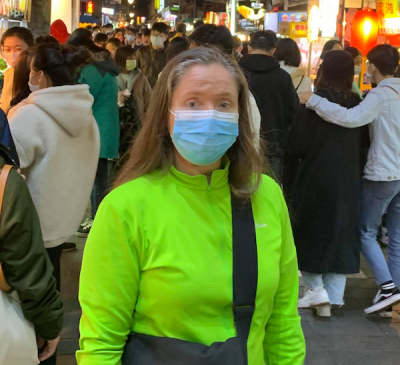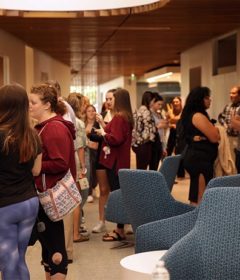Timely Sabbatical in Taiwan

In a sense, the timing could not have been much better.
Stetson’s Rachel Core, PhD, an associate professor in the Department of Sociology and Anthropology, barely made it through travel restrictions on the way to her sabbatical in Taiwan. Due to a new strain of COVID-19, Taiwan had closed to foreigners, but Core had a visa with special entry permission. It was the one type of visa, in fact, that the country was still allowing. She departed on Dec. 31 and arrived in Taiwan the morning of Jan. 2, 2021.
So, two weeks later, there Core was on a Zoom call during her final day of mandated quarantine by the Central Epidemic Control Center, talking about plans for her next seven months on a Taiwan Fellowship. All travelers to Taiwan must quarantine for 14 days, followed by seven days of health observation, as part of an exacting process — twice-daily temperature checks, electronic symptoms reports, daily text messaging and regular calls, among other precautions.
Core is no stranger to such travel. She speaks, reads and writes Mandarin Chinese, which is used both in Taiwan, officially the Republic of China, and on the Chinese Mainland. Core selected undergraduate study at Carleton College in Minnesota because it had founded two programs to China, both of which she attended before moving to China 10 days after graduating with a BA in Asian Studies.
Core then earned a master’s degree from the School of Oriental and African Studies at the University of London, and a PhD in sociology from The Johns Hopkins University, which included a Fulbright scholarship to Mainland China. Those academic achievements set the stage for the Taiwan Fellowship, awarded through the Taiwanese Ministry of Foreign Affairs.
Further, in 2016 Core brought Stetson students to China and was scheduled to do the same in 2020 before the pandemic hit.
Core actually was offered two awards through the National Central Library: the Center for Chinese Studies Research Grant and the Taiwan Fellowship. She chose the latter by virtue of its longer seven-month duration.
Now, Core, as the only Stetson professor currently in Asia, seeks to maximize her time there.
“The work is now more timely. … It has changed a lot. COVID obviously gives it new framing and relevancy.”
Associate Professor Rachel Core, PhD, about the continuation of research focusing on the People’s Republic of China
Her work is the continuation of research chiefly focusing on the People’s Republic of China. Specifically, it’s about the rise and decline of the urban work-unit system, and how that affects people’s access to infectious disease control, primarily tuberculosis but also applicable to many other infectious and chronic diseases.
The work-unit system has been in place since the 1950s, following the 1949 revolution in China and remaining until the 1990s, essentially involving the assignment of people to a workplace until retirement. In turn, the workplace took care of expansive benefits, such as health care, housing, schooling for children and more. Through the years, Core studied preventive health programming and case finding — with special attention to social determinants of access to health care and infectious control.
In Taiwan, Core finds herself in the midst of new relevance. She is in final stages of manuscript preparation for a book project, with the contents expanding her dissertation written at Johns Hopkins, where she graduated in 2013. The manuscript, “A Great Leap Forward in Health,” examines why, after controlling TB successfully from the 1950s to the 1990s, China began facing TB-control challenges at the same time it was becoming an economic superpower. Her research provides evidence from the urban-employment system in Shanghai to illustrate how a great leap forward in health was made.
“The work is now more timely,” said Core on Zoom.
“It has changed a lot. COVID obviously gives it new framing and relevancy. … I’m hoping the [book publishers] say this is a really relevant topic that has lessons for the current day, because it does.”
Core will be in Taiwan until the end of July before returning to Stetson for the fall semester. Next fall, she expects to resume one of her usual courses on the social determinants of health — class, gender affecting people’s access to health care and health outcomes — as well as the social construction of health and illnesses, and the way health professionals interact with patients.
Also, last spring, just as the pandemic closed Stetson, Core taught a special course for juniors called Examining a Pandemic: An Interdisciplinary Approach to Tuberculosis. She described it as a “fascinating class to be teaching because everything was relevant.”
When back at Stetson, Core is looking forward to more of the same.
“I’m sure students,” she concluded, “will be excited to take these courses again.”
-Michael Candelaria
DID YOU KNOW?
On Dec. 22, 2020, Taiwan, a country of approximately 23 million, recorded its first known of COVID-19 community transmission in more than 250 days. Mandated mask-wearing has been strictly enforced. By contrast, in early January 2021, Florida — a state of roughly the same number of residents — averaged more than 10,000 COVID-19 cases per day.



